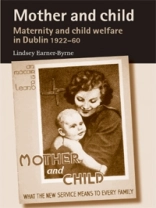This fascinating book provides a detailed account of the history of maternity and child welfare in Dublin between 1922 and 1960. In so doing it places maternity and child welfare in the context of twentieth-century Irish history, offering one of the only accounts of how women and children were viewed, treated and used by key lobby groups in Irish society and by the Irish state.
Mother and child is of critical importance to understanding the political and social history of modern Ireland as it examines the responses of the State, the church, voluntary groups and women to the emergence of the welfare State in Ireland. As such it makes a welcome contribution to Irish political, social, medical and gender history.
Table of Content
List of Abbreviations
Glossary of Irish words
List of Tables
Acknowledgments
Introduction
1 Maternity and child welfare pre-independence
2 Maternity and child welfare: setting the agenda, 1922-39
3 The Dublin mother: maternal welfare and child health, 1920-40
4 The Emergency: The war, the poor, the church and the state, 1939-45
5 Cracks in the ‘cordial collaboration’: Political reality and religious principle, 1945-56
6 Maternity on the ground: The Dublin experiment, 1945-56
7 Illegitimate motherhood, 1922-60
Conclusion
Bibliography
About the author
Lindsey Earner-Byrne is Lecturer in Modern Irish History in the School of History and Archives, University College Dublin












